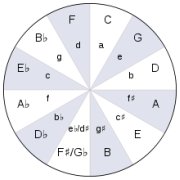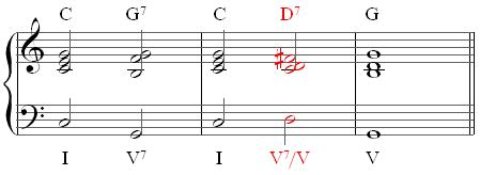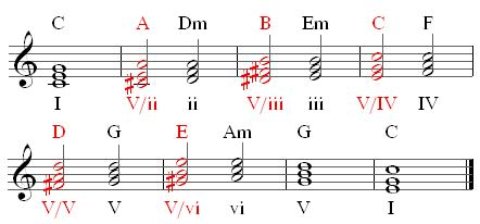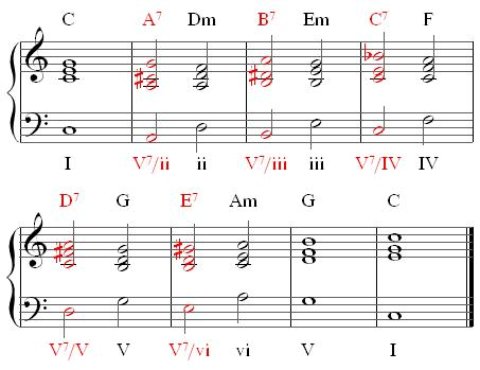Secondary Dominants
V of ii - V of iii - V of IV - V of V - V of vi

Secondary Dominants: "In music, the dominant is the fifth scale degree of the diatonic scale, called "dominant" because it is next in importance to the tonic. A dominant chord is any chord built upon that pitch, using the notes of the same diatonic scale. The dominant function creates instability that requires the tonic for resolution..." (From Wikipedia)
Translation: the dominant chord is built on the 5th diatonic scale degree. So the dominant of C is G - the dominant of G is D - the dominant of Eb is Bb etc...
So, by the definition above, in a dominant 7th chord, the triad is major and the 7th is minor. (This is a V7, or dominant 7th chord.)
In the circle of fifths, the a secondary dominant will always be found immediately clockwise of the chord to which it is leading... and would resolve counterclockwise to that chord.
For example, in C: V is G and resolves to C and V/V is D and resolves to G. (The secondary dominant is in red)

Here is the same example... this time a dominant 7th chord is used.

The example below demonstrates the dominants of all the diatonic chords in C major. Once again,
these dominants are in red.

Below is the same chord progression... however, this time the dominants are dominant 7th chords.

FREE DOWNLOAD: Seventh chords!
Click the icon to download s free PDF of ALL 7th, minor 7th and major 7th CHORDS. You can then save a copy or print a hard copy of the included sheet.
Harmony and Theory: A Comprehensive Source for All Musicians (Musicians Institute) by Carl Schroeder and Keith Wyatt.
For a comprehensive, concise reference about primary chords, secondary chords, secondary dominants & chord progressions, this book is a "MUST HAVE".
Here is part of a review of this book by Patrick D. Goonan ... The review is from: Harmony and Theory: A Comprehensive Source for All Musicians (Essential Concepts (Musicians Institute).
"...I absolutely love this book. It covers essential music theory is a very short space in a well-organized manner. More importantly, it emphasizes the concepts that are most important to a musician who wants to develop their practical skills at chord substitution, improvisation, voicing chords, etc..."

7th chords - chord inversions - sus chords
extended chords - diatonic triads - diatonic 7th chords
primary chords - secondary chords - secondary dominants
THE COMPLETE
ONLINE BUSINESS BUILDER
SBI
Hi and Welcome!
Fill out the form below to sign up for the free periodic
Player's Guide Newsletter!
Get tips and ideas about substitute chords, chord progressions and harmonic movement.
What's this???
The Complete book of:
Scales, Chords,
Arpeggios & Cadences
Harmony and Theory:
by Carl Schroeder and Keith Wyatt






New! Comments
Please leave me a comment in the box below.